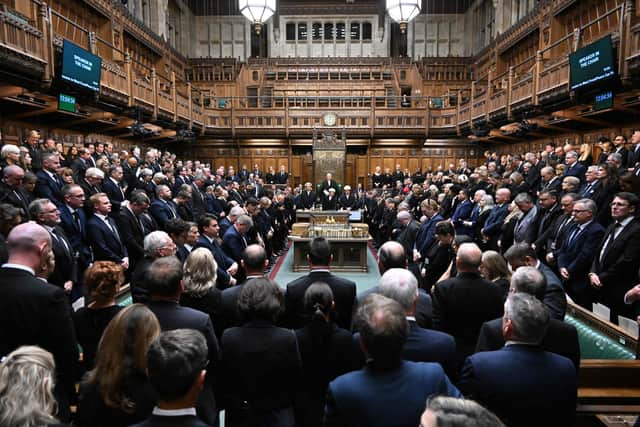Parliament puts aside its differences to remember the Queen
Former prime ministers, party leaders and MPs congregated in Parliament to share their sorrow at the passing of the country’s longest serving monarch and recount moments that they had shared with her over her 70-year reign.
It saw the Labour Party and the Conservatives, who have spent the past two months vigorously disagreeing over how to protect the public and the economy from the rising cost of energy, join together in a show of political unity in the Queen’s memory.
Advertisement
Hide AdAdvertisement
Hide AdIt also marked a delay on ministerial visits, government business, political campaigning and even the Bank of England’s announcement on interest rates, all in memory of Queen Elizabeth.


Liz Truss, who became Prime Minister after meeting the Queen on Tuesday, began the hours of speeches from dozens of MPs.
“During her first televised Christmas message in 1957 she said: ‘Today we need a special kind of courage so we can show the world that we are not afraid of the future’,” she said, adding: “We need that courage now.”
“In an instant yesterday our lives changed forever. Today we show the world that we do not fear what lies ahead.”
Advertisement
Hide AdAdvertisement
Hide AdHer words were echoed by Sir Keir Starmer, the Labour leader, who quoted Philip Larkin, the poet who worked and wrote much of his poetry in Hull.
“In times when nothing stood, but worsened or grew strange, there was one constant good, she did not change,” he recited.
“It feels like we are once again in a moment in our history where - as Larkin put it - things are ‘growing strange’.
“When everything is spinning, a nation requires a still point, when times are difficult, it requires comfort, and when direction is hard to find, it requires leadership.
Advertisement
Hide AdAdvertisement
Hide Ad“The loss of our Queen robs this country of its stillest point, its greatest comfort, at precisely the time we need those things most.”
Boris Johson, the former prime minister, who also met the Queen on Tuesday when he left office, declared her “Elizabeth the Great”.
“And over that extraordinary span of public service, with her naturally retentive and inquiring mind, I think and doubtless many of that 15 would agree she became the greatest statesman and diplomat of all,” he said.
Harriet Harman, the longest-continuously-serving female MP, reminded MPs what barriers the Queen had overcome to lead the United Kingdom at the start of her reign “in what was emphatically then, a man’s world”.
Advertisement
Hide AdAdvertisement
Hide Ad“We have to remember what attitudes were at the time. The order of the day was: men were in charge and women were subservient,” she told the Commons.
“It was in that atmosphere that she stepped up as a 25-year-old married woman with two children to take her place at the head of this nation and play a huge role on the world stage.
“What determination and courage that must have taken,” she said.
Other MPs recounted the lighter side of their memories of the Queen, such as Theresa May who recalled a picnic with Her Majesty where she was spotted accidentally dropping a block of cheese onto the floor.
Advertisement
Hide AdAdvertisement
Hide Ad“I had a split-second decision to make,” she said and explained that while picking it up and putting it back on the plate, before realising the Queen had been watching.
“She looked at me and she just smiled. And the cheese remained on the table,” she added.